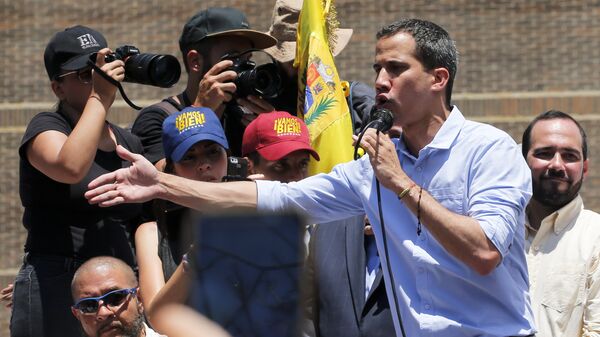A spokesperson for the US Department of State said Wednesday that Washington was looking to redirect funds designated for Latin American countries including Honduras, Guatemala and El Salvador to the Venezuelan self-proclaimed interim president, Juan Guaido, according to CNN.
"Working with Congress, we are exploring reprogramming some of the funding towards promoting democracy in Venezuela, including supporting the interim Guaido government and National Assembly [...] Our programming, existing and planned, is targeted to address the Venezuela crisis. We are investing in good governance, human rights, technical assistance for the Guaido government, independent media, and civil society [...] The principle objective of our funding for Venezuela aligns with our principle policy objective: to restore democracy to Venezuela", the US State Department spokesperson said, cited by CNN.
The spokesperson noted that the funding falls under the rubric of development assistance, adding that the US State Department "regularly adjusts funding as priorities evolve" because it is a "technical process tied to our strategic planning so that we spend taxpayer dollars responsibly and in line with Administration priorities", according to a statement, cited by CNN.
The Los Angeles Times suggested earlier this week, citing a USAID memo, that the Trump administration had mulled diverting about $50 million to the Venezuelan opposition. In particular, Guaido and his associates would reportedly receive this money for paying "their salaries, airfare, 'good governance' training, propaganda, technical assistance for holding elections and other 'democracy-building' projects".
In March, US President Donald Trump ordered the State Department to cut all direct financial assistance to the so-called Northern Triangle countries; El Salvador, Honduras and Guatemala.
These Central American countries are reportedly the main source of migrants to the United States, and Washington has for years provided assistance to local authorities so as to help stabilize the social environment to prevent the outflow of migrants.
Venezuela is experiencing a political-economic crisis that intensified in January after US-backed opposition leader Juan Guaido proclaimed himself interim president in a bid to oust President Nicolas Maduro. The United States recognized Guaido and started imposing sanctions on Venezuela and freezing billions of dollars of Venezuela’s assets.
Maduro has called Guaido a US puppet and accused the United States of orchestrating a coup in Venezuela to force a change of government and claim the country’s vast fossil fuel reserves.
Russia, which recognizes the constitutionally-elected Maduro as the legitimate president of Venezuela, said the United States is strangling the country with sanctions in an attempt to drag it into chaos.


